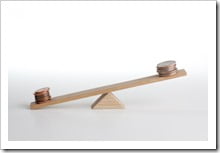 When choosing a term, it’s often necessary to compare mortgages side by side—for example: a fixed rate and a variable rate.
When choosing a term, it’s often necessary to compare mortgages side by side—for example: a fixed rate and a variable rate.
This comparison typically entails running hypothetical amortization schedules on each mortgage and then comparing the total payments and ending balances.
Doing this gives you a close enough idea of the relative borrowing cost difference, but there’s an extra step if you prefer to be more precise.
“It’s very important when you’re comparing mortgage terms to compare cash flows,” says York University Professor Moshe A. Milevsky. “In almost no other comparison in personal finance do you have to worry about that, but with mortgages you do.”
When comparing the true cost of two mortgages, you need to calculate the present value of each mortgage’s payments, fees and balance at maturity.
 If the monthly payments differ—suppose you’re comparing a lower rate to a higher rate—then you must make an assumption on the return that the borrower could earn if he/she invested that payment difference elsewhere. (Of course, whether the borrower actually invests that payment savings is another matter.)
If the monthly payments differ—suppose you’re comparing a lower rate to a higher rate—then you must make an assumption on the return that the borrower could earn if he/she invested that payment difference elsewhere. (Of course, whether the borrower actually invests that payment savings is another matter.)
To sidestep these intricacies, one can make one very simple assumption: that the borrower will always make the higher of the two mortgage payments being compared.
Here’s a simple example showing monthly payments for two hypothetical mortgages (a variable and a fixed):
Year 1
5yr Variable > $400 — 5yr Fixed > $700
Year 2
5yr Variable > $400 — 5yr Fixed > $700
Year 3
5yr Variable > $400 — 5yr Fixed > $700
Year 4
5yr Variable > $900 — 5yr Fixed > $700
Year 5
5yr Variable > $900 — 5yr Fixed > $700
To avoid the complexities of “discounting” cash flows, we simply equalize the payments.
In other words, we assume the borrower would pay:
- $700 a month in years 1-3 (a $300 overpayment on the variable)
- $900 a month in years 4-5 (a $200 overpayment on the fixed)
 Making extra payments on a mortgage often makes good sense regardless. And let’s face it, if you’re comparing a higher payment mortgage to a low payment mortgage, you have to be prepared to make that higher payment anyway.
Making extra payments on a mortgage often makes good sense regardless. And let’s face it, if you’re comparing a higher payment mortgage to a low payment mortgage, you have to be prepared to make that higher payment anyway.
The challenge is that few mortgage calculators make it easy to equalize payments, especially when you assume that rates will change during the mortgage term. Mortgage professionals have internal calculators that can do it, along with comparing different term lengths and making detailed rate assumptions. But we’ve yet to see a similar online tool for consumers. For this reason, our operatives at RateSpy.com have created one. Here’s the mortgage calculator link if you want to check it out.
Rob McLister, CMT







Awesome calculator Rob. Thanks for the link!
About the spreadsheet, I love how you can easily plot prepayments at different dates during the term. Thank you for sharing it.